Dickinson’s Queerer Season Three Gave Fans the Perfect EmiSue Love Scene
With a little help from Taylor Swift.

Dickinson has blessed EmiSue lovers with the queerest arc in this third and final season, which includes a surprise for the couple’s most loyal fans.
Despite what may sound like a hopeless premise, the Apple TV+ series has brought the poet’s rumored love for her sister-in-law to life in imaginative ways.
In the pilot, Susan “Sue” Gilbert (Ella Hunt) gets engaged to Emily’s (Hailee Steinfeld) brother Austin (Adrian Enscoe), with them tying the knot at the end of the first season. Yet, instead of caving to the star-crossed queer lovers trope, showrunner Alena Smith managed to break free from the heteronormative constraints of the time, giving Emily and Sue multiple chances to thrive.
Needless to say, the show has quickly become a queer community favorite, especially for female and non-binary viewers. One of Dickinson’s best qualities is being in conversation with the fandom, rather than shutting fan theories down, which gives EmiSue’s latest sex scene and *that* soundtrack in episode nine, “Grief is a Mouse,” an even greater significance.
After a whole third season grappling with the poet’s role at a trying time like that of the Civil War, Emily seems to have found her answer and purpose. Tragically, her quest has come at the expense of the relationship with Sue, as the latter doesn’t fail to point out. The two reconcile in this episode—a joyous, collective farewell party to those off to war, delivered in the show’s signature deliciously flamboyant, raucous style.
For once, Emily throws caution to the wind. She takes a break from her verses to focus on the flesh in a sex scene as messy and passionate as it gets. What comes after that moment proves to be Smith’s biggest gift to EmiSue fans in the form of a Taylor Swift song—and not just any song.
Swift’s ballad “Ivy” plays as the end credits roll, right after viewers see Emily’s face brimming with pleasure, fully surrendering to Sue.
Part of the album evermore, “Ivy” is believed to be about Emily Dickinson and Sue Gilbert. When Swift’s album came out in late 2020, fans were quick to connect the dots, realizing the American poet might have been an inspiration for the singer-songwriter.
Known for leaving trails of clues ahead and after each work, Swift announced there was a sister album to folklore on the author’s birthday, December 10. What’s more, the title of the record seems to be inspired by the last word—“forevermore”—in a poem Dickinson dedicated to Gilbert, “One Sister Have I in Our House.” Particularly, it’s “Ivy” that has caught the fans’ eye with its lyrics of longing for someone who is promised to another, and the secret relationship that ensues.
“I think it makes this Emily and Sue moment just unforgettable, especially for fans who have been on this journey with us. I wish our end credits were longer so you could hear the whole song,” Smith told BuzzFeed about featuring the song.
While the connection Emily and Sue had in real life is still being explored by scholars, Dickinson dares be openly queer from the get-go. For this semi-autobiographical story, being unapologetically queer means the conflict doesn’t lie in Emily’s sexuality.
Emily and Sue’s mutual feelings and attraction are never questioned; their queerness is never discussed—until episode seven of this final installment, where Emily opens up to her sister Lavinia (Anna Baryshnikov). Prompted by a time-traveling encounter with fellow poet Sylvia Plath (Chloe Fineman), the Amherst poet acknowledges her love for Sue but refrains from using any label.
When Plath says Emily Dickinson was believed to be a “lesbian,” she does so in such an exaggerated fashion it almost sounds like a dirty word. Unfazed, Emily and Lavinia don’t even know what she is on about. In the episode, it becomes apparent that the judgment on Emily’s sexuality and her same-sex relationship comes from the outside, from posterity, rather than from her bubble of liberal friends, or her own vision of it. To Emily, that’s just love.
For a show that makes such clever use of magical realism to convey Emily’s internal world, it’s only natural for that imagination to also be inherently queer. From the poet’s whirlwind visit to a fantasy queer bar with Walt Whitman (Billy Eichner) to Em and Sue’s sexy, gender-defying dance in hell, Dickinson is loud and proud, and then some.
Both Emily and Sue may have had flings and affairs with men throughout the three seasons. Yet, they always go back to one another, each time more intensely so than before. The magnetic pull between the two women—a result of Steinfeld and Hunt’s incendiary onscreen chemistry—is explored through fiery banter, private confessions, and breathtaking, beautifully choreographed intimate scenes just like the one in the latest episode, a carefully crafted culmination of Emily and Sue’s romance.
Smith made sure to never settle for a sanitized version of queer love, but to show their unique bond in its most sensuous, sexual aspects, as well.
Adding to the canon, Dickinson has taken upon itself the invaluable, difficult task of reframing Emily’s story and legacy in popular culture, whilst gifting the audience a love story for the ages—one that truly is forevermore.
(image: Apple TV+)
Want more stories like this? Become a subscriber and support the site!
—The Mary Sue has a strict comment policy that forbids, but is not limited to, personal insults toward anyone, hate speech, and trolling.—
Have a tip we should know? tips@themarysue.com